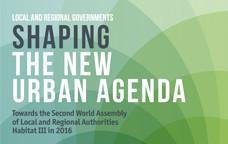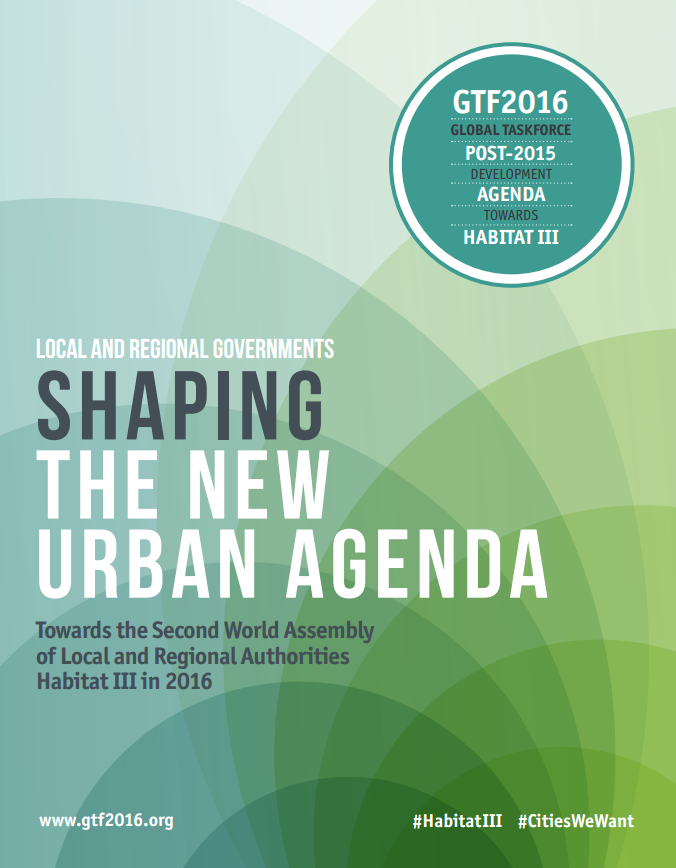
The United Nations General Assembly will convene a third United Nations Conference on Housing and Sustainable Urban Development (Habitat III) that will take place in Quito, Ecuador, during the week of 17 October 2016. The Second Preparatory Meeting towards Habitat III, or “PrepCom2”, will take place in Nairobi, Kenya, from 14 to 16 April followed by the 25th Governing Council of UN-Habitat (17-23 April). PrepCom2 will deal with reports on implementation of Habitat II and will define the process and agenda for the Conference next year.
A strong delegation of local governments is expected at the Second Preparatory Committee in order to advocate for the acknowledgement of local authorities as full partners in shaping that agenda and being involved in its implementation and monitoring.
The main objective of the conference is to reinvigorate the global commitment to sustainable urban development, focusing on the implementation of the New Urban Agenda
The Habitat III Conference is a high priority of our agenda internationally as it will define the New Urban Agenda that will inspire policies of the international community in the coming decades. This conference will assess the Habitat II commitments from Istanbul in 1996, which was a significant moment for the movement of local and regional authorities. The Conference will offer the first global platform after the adoption of the new Sustainable Development Goals and provides an opportunity to discuss the challenges that the urban dimension brings to the implementation and achievement of the new Goals.
Habitat III should see the acknowledgement of local authorities as full partners in shaping the global agenda in an increasingly urbanizing world. It will also be the time to call for changes to governance in those agencies dealing directly with local government matters. Local and regional authorities will be actively involved in the consultation process and will organize the second World Assembly of Local and Regional Authorities.
Recalling our ambitions; capitalizing on efforts
Local and regional government leaders and their global organizations gathered in the Global Taskforce of Local and Regional Governments for Post-2015 Development Agenda and towards Habitat III, are working together in order to build a joint strategy to contribute to the international policymaking debates towards Habitat III.
The Global Taskforce, facilitated by UCLG, offers its capacities to convene local and regional authorities and provide global representation before the UN, as well as to forge strategic partnerships to facilitate worldwide consultations among the key networks of sub-national governments.
The new Habitat agenda will need to pay close attention to who needs to be empowered and included in decision-making at all levels.
The Global Taskforce, together with the UN and the international community, will work on the definition of this new Habitat agenda, which will need to distance itself from the dichotomy of rural versus urban. It will need to put cohesion among territories at its forefront, acknowledging the important processes of metropolization that are currently taking place.
Although the partnership with local authorities and their organizations has made important progress in recent years, collaboration is still partial and restricted to specific areas (global advocacy); it is more limited in operational programmes. The enhancement of the strategic partnership promised in Habitat II has yet to be developed.
The main weakness of the Habitat II agenda was the unclear “means of implementation”. The commitment of Habitat II to support local governments and strengthen local capacities to develop “sustainable human settlements in an urbanizing world” has certainly permitted some progress, but it failed to achieve mass support or to fully mobilize local capacities and potentials.
The massive backlogs in housing, basic services and urban infrastructure require more decisive policies and investments by the state and local authorities, and closer cooperation between local authorities and other levels of government. Effective multi-level and multi-stakeholder governance requires appropriate institutional and legal frameworks that are guided by the principle of subsidiarity, and that clearly define the roles, responsibilities and resources of all levels of government.
Getting ready for the second PrepCom – On the way to the second World Assembly of Local and Regional Authorities in 2016
PrepCom II will take place in Nairobi, Kenya from 14 to 16 April and will be followed by the 25th Governing Council of UN-Habitat (17-23 April) also in Nairobi.
As the GTF has repeatedly expressed, the development agenda should be a single and integrated one.
Local and Regional Governments Days in Nairobi, 12-13 April:
Two sessions of local and regional authorities’ consultation will take place back to back with the PrepCom2 and will take place on 12th and 13th April, when local and regional authorities will meet to prepare their engagement in the consultation process and preparations of the Second World Assembly of Local and Regional Authorities.
For more information:
- Check out the page related to Habitat III
- Programme overview
- Local authorities’ days agendas (12 and 13 April)
- Side Events concept notes (GTF, Finance, Partnership)











